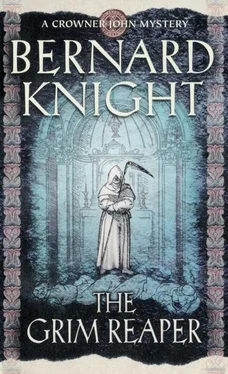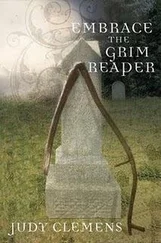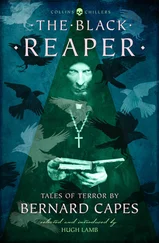Bernard Knight - The Grim Reaper
Здесь есть возможность читать онлайн «Bernard Knight - The Grim Reaper» весь текст электронной книги совершенно бесплатно (целиком полную версию без сокращений). В некоторых случаях можно слушать аудио, скачать через торрент в формате fb2 и присутствует краткое содержание. Год выпуска: 2002, ISBN: 2002, Издательство: Simon and Schuster, Жанр: Исторический детектив, на английском языке. Описание произведения, (предисловие) а так же отзывы посетителей доступны на портале библиотеки ЛибКат.
- Название:The Grim Reaper
- Автор:
- Издательство:Simon and Schuster
- Жанр:
- Год:2002
- ISBN:9780671029678
- Рейтинг книги:5 / 5. Голосов: 1
-
Избранное:Добавить в избранное
- Отзывы:
-
Ваша оценка:
- 100
- 1
- 2
- 3
- 4
- 5
The Grim Reaper: краткое содержание, описание и аннотация
Предлагаем к чтению аннотацию, описание, краткое содержание или предисловие (зависит от того, что написал сам автор книги «The Grim Reaper»). Если вы не нашли необходимую информацию о книге — напишите в комментариях, мы постараемся отыскать её.
The Grim Reaper — читать онлайн бесплатно полную книгу (весь текст) целиком
Ниже представлен текст книги, разбитый по страницам. Система сохранения места последней прочитанной страницы, позволяет с удобством читать онлайн бесплатно книгу «The Grim Reaper», без необходимости каждый раз заново искать на чём Вы остановились. Поставьте закладку, и сможете в любой момент перейти на страницу, на которой закончили чтение.
Интервал:
Закладка:
‘I’ll ask that snivelling clerk of mine,’ said John. ‘He knows all about pens and parchment and suchlike. Though how we’d go about such a test is beyond me.’
It was approaching the time for the midday meal and when they reached the corner of Martin’s Lane, de Relaga trotted off to his comfortable house near Carfoix to enjoy his usual large dinner.
De Wolfe walked past his own home, glancing furtively at the door in case Matilda appeared. He carried on past the farrier’s opposite, where his horse Odin was stabled, then continued across the front of St Martin’s church on the corner of the Close. Though he saw the small building several times a day, he looked at it now with renewed interest, as he had at every one of the parish churches he had passed that day. Did this one house a murderous priest, he wondered.
He loped past the first few houses of Canon’s Row, which was the continuation of Martin’s Lane forming the northern boundary of the Close, with the huge bulk of the cathedral towering above him to his right. His gaze rose unbidden to the narrow builder’s gallery that ran along the outside of the nave, just below roof level and almost forty feet above the ground. Just before it met the massive projection of the North Tower, there was still a faint pale smear running down the masonry, where Thomas’s cloak had rubbed off some of the lichen from the stones when he had made his unsuccessful suicide bid some weeks earlier. If that garment had not snagged on a protruding water-spout halfway down and broken his fall …
De Wolfe sighed at the memory, and forged on past the large, closely packed houses until he reached the dwelling of Archdeacon John de Alençon. There were four archdeacons, each responsible for one part of the huge diocese of Devon and Cornwall. De Alençon’s responsibility was the city of Exeter, the most populous area with some four thousand inhabitants served by those numerous parish churches.
The house was tall and narrow, and stretched back a long way to the yard behind, with a privy, kitchen-shed and laundry-hut. The canons’ houses were all different, with varying frontages and roofs, but all were spacious enough to accommodate a priest, sometimes his vicar, and a number of servants.
The canons were expected to offer hospitality to visitors and to hold regular feasts for the benefit of prominent citizens and senior clergy. Many enjoyed this festive existence, being fond of luxuries and good living. The Spartan precepts of Bishop Leofric who, in the previous century, had introduced the strict Rule of St Chrodegang had long been forgotten by most, but John de Alençon was an exception. An ascetic man, he kept his house simply furnished, had but three servants and, apart from a moderate appreciation of fine French wine, appeared free of vices.
His bottler showed de Wolfe into the Archdeacon’s study, which was also his bedroom. The only furniture was a pallet in one corner, a plain table with two chairs and a large wooden crucifix on the wall. De Alençon rose from the table where he had been studying a bulky leatherbound book. His thin face broke into a warm smile as he greeted his friend, the lined brow and cheeks lit up by the bright blue eyes. He grasped de Wolfe’s arm in welcome, and motioned to his servant to bring wine.
Moments later, they were seated across the table from each other, a cup of best Anjou red in their hands, with a stone jug between them for replenishment.
‘How is that poor nephew of mine faring?’ asked de Alençon.
‘I sometimes fear for his sanity,’ said John. ‘He’s taken to talking to himself a lot and he glares at the world as if he hates its very existence — but at least he’s not tried to kill himself lately.’ He took a long sip from his cup, savouring the flavour of the French grapes. ‘I suppose you’ve heard nothing more about any possibility of his being received back into the Church?’
The Archdeacon shook his head sadly. ‘As I told you before, John, it seems quite impossible. There are forces working against him because they wish to see you shamed.’ There was a short silence as he refilled their cups then looked at his friend with a quizzical smile. ‘But you didn’t come here to talk about Thomas?’
The coroner shook his head. ‘I have a couple of questions for you. You’re always a fount of knowledge when I need it.’
The senior cleric smiled gently. Painfully thin, his plain black cassock fell loosely about his narrow shoulders. The short, crinkled hair that covered his head was grey, though he was barely a dozen years older than de Wolfe’s forty summers.
‘I’ll do what I can, John. I doubt you wish to discuss theology.’
The coroner’s first question was about the burial of the murdered Jew.
‘I’ve heard about the killing,’ replied the Archdeacon. ‘That house belongs to our Chapter. The Treasurer’s clerk was muttering this morning that, as a tenant, the cloth merchant had no right to rent out those rooms.’ He rubbed his long thin nose. ‘I claim no real knowledge of Jewish funeral rites. I expect you know as well as I that they do their utmost to bury their dead before the next nightfall.’
‘That’s impossible in this case,’ replied de Wolfe. ‘We’re waiting for the daughter to come from Honiton tomorrow.’
‘Is it really impossible?’ answered de Alençon gently. ‘If she has the body taken away, the delay will be even greater. Why not bury it today? There are other Jews in Exeter who would gladly see to the arrangements.’
‘The daughter may wish to see her father’s body. And where can we bury him? Surely your Church would not welcome him in one of their grave-pits.’
De Alençon smiled sadly. ‘Certainly that would be impossible. Unlike some of my brethren, I feel great sympathy for his race, especially since the tragic disgrace in York and other cities, which followed King Richard’s Coronation. But there is now a small plot outside the walls in Southernhay which those of the Hebrew faith have purchased for a cemetery.’
The coroner chewed this over in his mind. ‘Maybe I’ll do that. Then his daughter can decide later what she wants done with him.’
De Alençon prompted his friend to ask the other question he had mentioned.
‘The same issue, really,’ replied de Wolfe. ‘This old fellow’s murder last night.’ As he related the story of the Gospel quotation he fished in the pouch on his belt and handed over the creased scrap of parchment.
After de Alençon had studied it, he handed it back and gazed steadily at his friend. ‘You’re wondering who could write and quote the Scriptures, other than a priest?’
The coroner nodded. ‘As usual, it was your nephew who spotted that straight away. Then Hugh de Relaga suggested that whoever wrote this might be traced by his penmanship. Is that possible?’
The Archdeacon pursed his lips dubiously. ‘I’ve never considered the matter before, John, but when I was in Winchester years ago, I was in charge of the scriptorium for a while and I could certainly have put a name to the writer of each document from the style in which he used his quill.’ He looked quizzically at de Wolfe.
‘But where would you start? There must be over a hundred clerics in Exeter, counting all the canons, vicarschoral and parish priests. Even the young secondaries and some of the choristers can read and write, you know.’
‘I doubt we need to consider the juniors in this. You are the Archdeacon of Exeter, so you must know all the parish priests. Are any of them strange or unstable?’
De Alençon smiled wryly. ‘We have our share of peculiar people in the Church, just as in any other walk of life, but no one that I would consider a potential killer.’
The coroner waved the parchment at him before he tucked it back into his belt-pouch. ‘What do you read into this, then? Is the perpetrator following some godly command from the Bible that he casts out the moneylender from the temple? And is he likely to go on cleaning up the city, like some holy vigilante?’
Читать дальшеИнтервал:
Закладка:
Похожие книги на «The Grim Reaper»
Представляем Вашему вниманию похожие книги на «The Grim Reaper» списком для выбора. Мы отобрали схожую по названию и смыслу литературу в надежде предоставить читателям больше вариантов отыскать новые, интересные, ещё непрочитанные произведения.
Обсуждение, отзывы о книге «The Grim Reaper» и просто собственные мнения читателей. Оставьте ваши комментарии, напишите, что Вы думаете о произведении, его смысле или главных героях. Укажите что конкретно понравилось, а что нет, и почему Вы так считаете.












